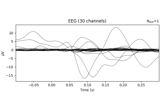mne.decoding.UnsupervisedSpatialFilter#
- class mne.decoding.UnsupervisedSpatialFilter(estimator, average=False)[source]#
Use unsupervised spatial filtering across time and samples.
- Parameters:
- estimatorinstance of
sklearn.base.BaseEstimator Estimator using some decomposition algorithm.
- averagebool, default
False If True, the estimator is fitted on the average across samples (e.g. epochs).
- estimatorinstance of
Methods
fit(X[, y])Fit the spatial filters.
fit_transform(X[, y])Transform the data to its filtered components after fitting.
Get metadata routing of this object.
get_params([deep])Get parameters for this estimator.
Inverse transform the data to its original space.
set_output(*[, transform])Set output container.
set_params(**params)Set the parameters of this estimator.
transform(X)Transform the data to its spatial filters.
- fit(X, y=None)[source]#
Fit the spatial filters.
- Parameters:
- Returns:
- selfinstance of
UnsupervisedSpatialFilter Return the modified instance.
- selfinstance of
- fit_transform(X, y=None)[source]#
Transform the data to its filtered components after fitting.
- Parameters:
- Returns:
- X
array, shape (n_epochs, n_channels, n_times) The transformed data.
- X
Examples using
fit_transform:
Analysis of evoked response using ICA and PCA reduction techniques
Analysis of evoked response using ICA and PCA reduction techniques
- get_metadata_routing()[source]#
Get metadata routing of this object.
Please check User Guide on how the routing mechanism works.
- Returns:
- routing
MetadataRequest A
MetadataRequestencapsulating routing information.
- routing
- set_output(*, transform=None)[source]#
Set output container.
See Introducing the set_output API for an example on how to use the API.
- Parameters:
- transform{“default”, “pandas”, “polars”}, default=None
Configure output of
transformandfit_transform.“default”: Default output format of a transformer
“pandas”: DataFrame output
“polars”: Polars output
None: Transform configuration is unchanged
New in v1.4: “polars” option was added.
- Returns:
- self
estimatorinstance Estimator instance.
- self
Examples using mne.decoding.UnsupervisedSpatialFilter#

Analysis of evoked response using ICA and PCA reduction techniques